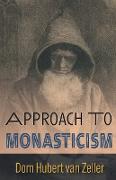Approach to Monasticism
BücherAngebote / Angebote:
Monastic life is a beginning, a becoming. It does not pretend to be anything more. It proposes a constant renewal, demanding of the soul a willingness to persevere in the light of what is shown by grace."
Not seeking to romanticize monastic life but to give a plain account of the vocation, Van Zeller presents here the real joys and difficulties of monastic life that are encountered in the various stages of one's formation. Since the monk seeks a moral beauty that is entirely supernatural, "the thought of the monk is at once spiritual and practical. Monastic life is not a dream but a reality, it is lived on both planes at once. Monasticism is not an ideal only, it is a way.... The monk can find what he is looking for only in Christ."
Approaching monasticism first from the perspective of those who have not entered, or have entered but recently and are still in the novitiate, Van Zeller dwells upon the various lessons, considerations, and questions of the young monk: whose job is it to discern? The individual's or the community's? How should one treat discernment after entering the monastery? Can one be too passive, too active? How should one treat attractions to other communities? What does one desire? Here he reminds his reader that "it is often through the soul's desires that God makes known his will. A man comes into a monastery in order to purify his own desires so that he desires only the desires of God."
For one having definitively chosen the monastic state, all of one's faculties needed to practice the Christian life are brought into sharp focus. Thus, Van Zeller shows that "the approach to monasticism is only the approach to Christianity through a narrower door. The end is the same, namely union with God."***
Born in British-controlled Egypt, Dom Hubert van Zeller (1905-1984) was a Benedictine monk of Downside Abbey in Bath, England, where he was educated. Of his scholastic career he said that he "passed no examinations-merely by-passed them." The author of numerous books ranging from scriptural commentary to fiction and biography, he was also renowned as a minimalist sculptor and cartoonist. He was a friend of Ronald Knox and of Evelyn Waugh, who described Dom Hubert's writings as "characterized by vitality and elegance.
Folgt in ca. 10 Arbeitstagen
